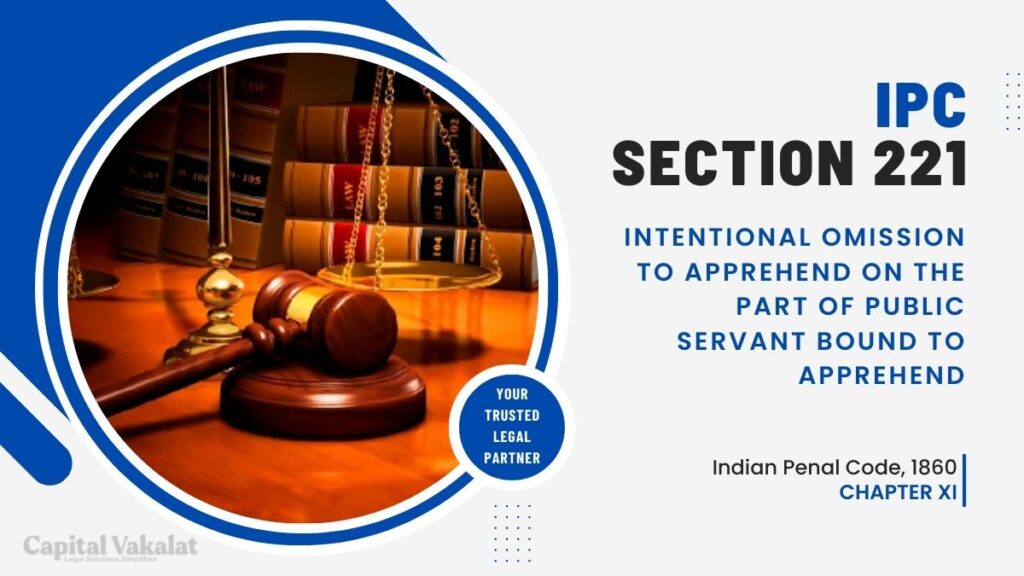In the vast realm of legal codes and statutes, the Indian Penal Code (IPC) stands as a cornerstone, governing various aspects of criminal law in India. Section 221 IPC, a lesser-known but equally significant provision, deals with “Intentional Omission to Apprehend on the part of a public servant bound to apprehend.”
This article delves into the depths of Section 221 IPC, deciphering its relevance, implications, and the legal intricacies surrounding it.

Understanding Section 221 IPC
Section 221 of the Indian Penal Code, or IPC, is a legal provision that deals with situations where a public servant, who is bound by law to apprehend a person, intentionally omits to do so. It is a provision that underscores the accountability and responsibility of public servants entrusted with maintaining law and order.
The Duty of a Public Servant to Apprehend
Before we delve into the intricacies of Section 221 IPC, it’s essential to grasp the fundamental duty of a public servant. Public servants, especially those involved in law enforcement and the administration of justice, have an obligation to apprehend individuals who have committed crimes. This duty is essential for upholding the rule of law and ensuring justice is served.
Intentional Omission: A Critical Perspective
The core of Section 221 IPC lies in the intentional omission. It means that the public servant, who should have apprehended an offender, deliberately fails to do so. This omission can arise from various reasons, including corruption, negligence, or external pressures. Understanding this intentional omission is crucial to comprehending the implications of this legal provision.
Instances of Section 221 IPC
To better understand how Section 221 IPC applies in real-world scenarios, let’s explore some instances where public servants’ intentional omission to apprehend has been at the forefront of legal cases. These examples shed light on the gravity of the offense and its impact on society.
Legal Implications and Consequences
When a public servant intentionally omits to apprehend, the legal implications can be severe. Section 221 IPC provides for penalties that may include imprisonment and fines. The consequences of this omission can be far-reaching, affecting not only the individual involved but also the credibility of the entire justice system.
Challenging the Intent
In legal cases involving Section 221 IPC, one common point of contention is the establishment of intent. Proving that a public servant intentionally omitted to apprehend someone can be a challenging task. It requires a thorough examination of the circumstances, evidence, and the motive behind the omission.
Balancing Act: Public Servant’s Dilemma
While Section 221 IPC emphasizes the responsibility of public servants, it’s important to recognize the complex situations they often find themselves in. Public servants sometimes face a moral dilemma, torn between their duty to apprehend and external pressures that may deter them from doing so. This section explores the delicate balance these individuals must maintain.
Key Decisions and Precedents
To gain a deeper insight into the application of Section 221 IPC, it’s essential to examine key legal decisions and precedents that have shaped its interpretation over the years. These cases provide valuable guidance on how the provision is upheld in practice.
The Need for Accountability
Accountability is at the heart of Section 221 IPC. This section delves into the importance of holding public servants accountable for their actions, especially when their omissions to apprehend result in injustice or the perpetuation of criminal activities.
Conclusion
In conclusion, Section 221 IPC plays a crucial role in maintaining the integrity of the justice system in India. It underscores the duty of public servants to apprehend offenders and the legal consequences when they intentionally omit to do so. While the provision is aimed at upholding justice, it also highlights the challenges and dilemmas faced by public servants in the pursuit of their duty.
Frequently Asked Questions
Can the intent to omit to apprehend be challenged in court?
Yes, the intent can be challenged in court, and proving intentional omission is often a central aspect of legal cases involving Section 221 IPC.
What are the legal consequences of a public servant’s intentional omission to apprehend?
The legal consequences can include imprisonment and fines, depending on the severity of the omission and its impact on justice.
How do key legal decisions and precedents shape the interpretation of Section 221 IPC?
Key decisions and precedents provide guidance on how the provision is applied in practice, helping to define its scope and implications.
What steps can be taken to ensure public servants fulfill their duty under Section 221 IPC?
Ensuring transparency, accountability, and providing support to public servants can help reduce instances of intentional omission and uphold the law effectively.